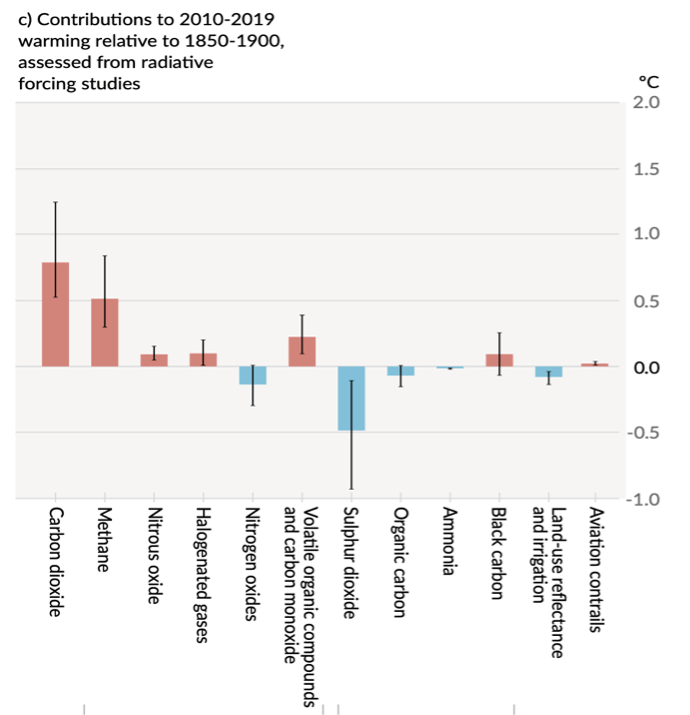IPCC’s Assessment Report highlights the urgency of sharp reductions in methane
Monday’s release of the UN’s newest climate report highlighted the fact that climate change is happening now; poses severe challenges to society; is attributable to human activities; and will get progressively worse and more harmful without dramatic cuts in emissions.
The report also clearly identifies methane abatement as a critical means of limiting future warming. In comparison to previous IPCC assessments, this report makes very clear that warming due to methane is a very large part of the warming we are already seeing today. For example, the figure below shows that while carbon dioxide emissions, to date, have caused global temperatures to rise 0.8°C, methane emissions have caused 0.5°C of warming. This new clarity will help CATF and our allies build momentum to rapidly and aggressively address methane pollution around the world.

Background: What is the IPCC Report that was issued this week?
Since the 1990s, the UN has convened the Intergovernmental Panel on Climate Change, or IPCC, a large international effort to synthesize and summarize what’s known about climate change. IPCC is now beginning to publish its Sixth Assessment Report, often referred to as AR6. This week, the first volume of that report, focusing on the physical/earth science of climate change, was published. Later volumes focused on impacts of climate change and mitigation approaches will be published next year.
How do the findings of AR6 compare to those from previous editions?
As our scientific understanding of climate change has improved and strengthened, IPCC’s reports have become clearer about the causes of climate change and the urgency of action required to avoid as much impact as possible. AR6 concludes that it is “unequivocal” that human activity is warming the climate and that we can be confident that human activity is the driver behind impacts such as glacier loss, sea-level rise, and increased heatwaves.
Likewise, reflecting an improved understanding of the impacts of climate change, AR6 paints a more dire picture of impacts human society will face if steep cuts are not made in climate pollutants like CO2 and methane. Specifically, the report makes clear that we can expect impacts such as more frequent/severe heatwaves, more intense rainfall and more frequent/intense drought, and more intense tropical cyclones to worsen, and that the impacts will escalate if emissions are not dramatically curtailed.
What are AR6’s topline findings on methane pollution?
As noted above, AR6 makes methane’s role as a primary warmer much clearer. AR6 also highlights the alarming increase in atmospheric methane concentrations that scientists have observed over the past decade, noting that this increase is most likely due in part to increased emissions from oil and natural gas operations.
AR6 also notes the key role that aggressive methane mitigation can play in limiting future warming, and the dire impacts of that future warming. This arises in part because methane has a relatively short lifetime in the atmosphere – natural chemical reactions in the atmosphere remove the pollutant after about two decades (which is much, much shorter than the effective lifetime of CO2 in the atmosphere). Therefore, aggressive reductions in methane pollution can lead to noticeable reductions in the degree of warming caused by methane on similar timescales. This makes methane abatement a key tool for mitigation of climate impacts that will be faced by society in the next decades.
Where do we go from here?
The global scientific and environmental community has begun coalescing around the need to rapidly reduce methane emissions, with a string of recent reports, statements, and investigations underscoring methane’s importance. In May, the United Nationals Environment Programme (UNEP) and the Climate and Clean Air Coalition (CCAC) issued the Global Methane Assessment, which found that currently available measures could reduce methane emissions by as much as 40-45% by 2030. These cuts to methane emissions could avoid nearly 0.3 degrees C of global warming by the 2040s. Reducing methane emissions is the only clear piece of climate action we can take now to substantially slow global warming over the next two decades. Climate tipping points are rapidly approaching, and we need aggressive action to cut methane this decade in order to avoid them. From the European Union to Nigeria to the United States and many other parts of the world, CATF is pressing for fast action and providing technical expertise to policymakers who are ready to act.




